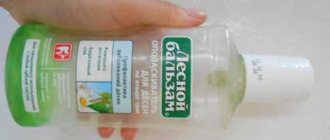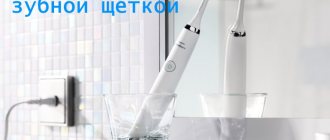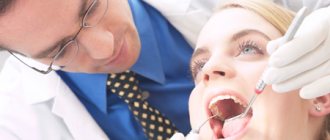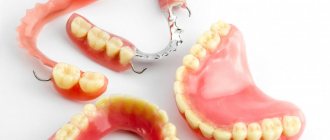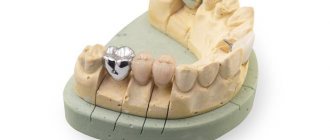Dentistry / Dentistry for pregnant women / Prof. hygiene during pregnancy
Professional teeth cleaning is an extremely popular service, because people want to please others with a beautiful smile. In addition, it is necessary to remove plaque not only for aesthetic reasons, but also because it prevents the development of pathogens and reduces the risk of developing dental diseases.
Should a pregnant woman see a hygienist for professional teeth cleaning services? Yes, definitely. The fact is that during the period of gestation, the expectant mother’s immunity decreases, and the oral cavity becomes especially vulnerable to bacteria. Often during pregnancy, caries develops extremely quickly, and, having affected one tooth, it soon spreads to neighboring ones. Pathogenic bacteria thrive especially in dental plaque. Removing it through effective cleaning can greatly improve the situation.
At the same time, you should not neglect the rules of personal hygiene. Remember to brush your teeth twice a day using a toothbrush and toothpaste. This will help remove much of the soft plaque. Also recommended:
- use dental floss;
- rinse your mouth after eating.
- use an oral irrigator
But only professional cleaning makes it possible to completely remove soft plaque and deal with hard plaque.
Please note that we are talking about cleaning and not bleaching. This procedure should be postponed to the future, when the woman not only gives birth to a child, but also stops breastfeeding.
Oral hygiene products for pregnant women
At first glance, oral hygiene during pregnancy is no different from any other period of our lives. But in reality this is not entirely true. Pregnant women's teeth are more fragile and weaker, since the baby takes a large amount of calcium and other useful minerals. To protect the enamel, it is necessary to use special pastes (with fluoride, calcium, medicinal herbs, etc.) without fragrances. You can purchase them in specialized online stores and pharmacies, after consulting with your doctor. The toothbrush should have medium-hard bristles or even soft bristles (always artificial bristles).
Every pregnant woman should have additional hygiene products, such as mouthwash You can also purchase dental floss and brushes to clean between your teeth. The irrigator removes up to 80% of plaque and allows you to maintain fresh breath and healthy teeth. To prevent caries, especially during pregnancy, such an attribute is simply necessary.
Contraindications to professional teeth cleaning
Specialists will select for you a cleaning method that will be absolutely harmless to the woman and her unborn child. However, there are a number of diseases in which the expectant mother is prohibited from brushing her teeth. These are, in particular:
- infections that are transmitted by airborne droplets;
- epilepsy;
- allergies to substances and preparations used for cleaning;
- venereal diseases;
- HIV;
- diabetes mellitus (decompensated stage);
- bronchial asthma during exacerbation;
- oncological diseases (without agreement with the attending physician);
Also, professional cleaning is contraindicated if you have an implanted pacemaker.
Before cleaning, the dentist conducts an examination. If you have any of the diseases listed above, be sure to warn a specialist about this. You will also need to take a blood test. Even if you have not been diagnosed with diabetes, if your sugar level is elevated, it is better to refuse the procedure.
Oral hygiene rules during pregnancy
- brush your teeth 2 times a day (at least 2 minutes);
- rinse your mouth after every meal;
- use an irrigator (can be used even after a snack - it will effectively remove food debris and fresh plaque);
- carry out professional teeth cleaning at least 2-3 times a year;
- visit the dentist (preventative dental examinations during pregnancy are very important);
- eat less sweets (sugar negatively affects teeth).
Dear mothers, remember, the health of children’s teeth depends on you. Predisposition to caries, as well as to malocclusion, can be transmitted genetically. Take care of your teeth during pregnancy and keep them clean and healthy! And “Medexpert” will be happy to help you in this difficult work. Our Family Dentistry Center provides treatment for dental pain and fear. Individual approach to each patient, quality guarantee, comfortable conditions and affordable prices. Have you been looking for a family dentist for a long time? He is waiting for you at the address Minsk, st. Nemanskaya, 67.
In what cases should you refuse cleaning?
Experts believe that there are reasons why an expectant mother may decide to refuse this procedure.
And these are not only medical contraindications. Firstly, many people, and not just pregnant women, feel nervous when visiting a dental clinic. Extra stress during pregnancy is completely unnecessary, therefore, if the expectant mother feels psychological discomfort, professional cleaning should be carried out only if there are appropriate indications: for caries, gingivitis, acute pain, and so on.
Secondly, brushing can cause discomfort and stress for pregnant women with sensitive teeth. The procedure leads to the fact that the teeth become even more sensitive, and this entails a lot of inconvenience. In this case, cleaning can be safely postponed for several months.
Dental implantation during pregnancy
A dental implant is a prosthetic procedure in which a multi-component implant structure is inserted into the jaw and subsequently fuses with it. This is an important operation from an aesthetic and medical point of view. Sometimes situations arise when emergency implantation is necessary. Otherwise, the patient risks her health - an abscess may form with further decay.
When is it undesirable to undergo dental implantation?
Doctors categorically do not recommend any surgery in the first trimester of pregnancy. This is the period when the fetus is actively forming vital organs. If at the current stage of the “situation” toxicosis is already severely manifested, it is also better to refrain from going to the dentist. It is worth refraining from prosthetics if a pregnant woman is afraid of any surgical operations. The resulting stress after the dentist has been visited and the treatment is completed will have a negative impact on further pregnancy.
Is it possible to think about prosthetics after childbirth?
After childbirth, there is also no need to rush into dental implantation. Dental implantation can be performed 2-3 months after childbirth (if health allows). But doctors believe that it is better to postpone manipulations in the dental office for at least a year. Because During the mother's recovery, even after successful dental surgery, complications may arise that will require her to take medications again and stop breastfeeding for a while.
Video about dental treatment during pregnancy
How to whiten teeth: features of the procedure
For professional whitening, special gels based on hydrogen peroxide or carbamide peroxide are used; these active substances act on dental tissue. They change the color of the pigment that is responsible for the color of teeth. In each case, the intensity of whitening depends on the procedure, the composition of the gel and, most importantly, on the natural characteristics of your enamel. Therefore, some will require several procedures, while others will shine with a Hollywood smile after the first one.
Whitening does not disrupt the crystal structure of the tooth, so there is no fear that it will somehow affect the mineral composition of the enamel.
Before you begin the actual whitening process, you should prepare thoroughly. Firstly, it is very important to cure teeth from caries and remove chips. Secondly, it is recommended to carry out professional hygienic cleaning about a week in advance, which will remove plaque and tartar. Depending on the condition of the teeth, preliminary remineralization therapy may be required. Your dentist will prescribe this procedure for you. It must be done a month before bleaching. Remineralization is needed to restore enamel and increase its strength. The procedure helps to avoid gum and tooth disease.
Remember that crowns and fillings will not lighten with bleaching. Therefore, after the procedure, they will stand out noticeably against the background of the snow-white surface of the tooth. Therefore, be prepared that they will have to be replaced. It is best to do this within two or three weeks.
Why are my teeth not white?
A bright Hollywood smile is the dream of many women; of course, everyone wants to look no less impressive than the stars on TV. Thanks to new technologies and growing popularity, it has become available to almost everyone. But do not forget that the color of enamel depends very much on genetics, and, in addition, on eating habits, smoking and many other factors. Because of this, not everyone manages to have beautiful light teeth.
In addition, in fact, a yellowish tint is characteristic of healthy teeth. We owe this to dentin - a light yellow substance that determines the shape of the tooth and is its basis. On top there is a layer of transparent enamel, through which the yellowish tint of dentin shines through.
The layer of dentin on fangs is much thicker than on other teeth, so they are always darker. These features are due to our nature, so you don’t have to worry that your smile does not shine white, since white is an unnatural color for it. But by today's standards, beauty is not always what comes naturally. In addition, progress gives us a wider choice for our own improvement. It should be understood that whitening always weakens the health of teeth, but with proper care this effect is temporary.
By the way, in addition to genetics, your habits also affect the color of your smile. The enamel has a crystalline structure; food pigments accumulate between its rods. Gels extract them from the enamel, allowing you to achieve impressive results.
Clinical researches
Clinical studies have proven that regular use of professional toothpaste ASEPTA GENTLE WHITENING for a month allows you to lighten tooth enamel by 1.5 tones, increases anti-caries effectiveness by 3.4 times and increases enamel remineralization by 2.6 times.
Sources:
- Report on determining/confirming the preventive properties of toothpaste “ASEPTA PLUS” GENTLE WHITENING” Author: doctor-researcher A.A. Leontyev, head Department of Preventive Dentistry, Doctor of Medical Sciences, Professor S.B. Ulitovsky First St. Petersburg State Medical University named after. acad. I.P. Pavlova, Department of Preventive Dentistry
- Report on the determination/confirmation of the preventive properties of personal oral hygiene products “ASEPTA PLUS” Remineralization doctor-researcher A.A. Leontyev, head Department of Preventive Dentistry, Doctor of Medical Sciences, Professor S.B. Ulitovsky First St. Petersburg State Medical University named after. acad. I.P. Pavlova, Department of Preventive Dentistry
- Clinical studies of antisensitive toothpaste “Asepta Sensitive” (A.A. Leontyev, O.V. Kalinina, S.B. Ulitovsky) A.A. LEONTIEV, dentist O.V. KALININA, dentist S.B. ULITOVSKY, Doctor of Medical Sciences, Prof. Department of Therapeutic Dentistry, St. Petersburg State Medical University named after. acad. I.P. Pavlova
- Report on determining/confirming the preventive properties of toothpaste “ASEPTA PLUS” COFFEE and TOBACCO Author: doctor-researcher A.A. Leontyev, head Department of Preventive Dentistry, Doctor of Medical Sciences, Professor S.B. Ulitovsky. First St. Petersburg State Medical University named after. acad. I.P. Pavlova, Department of Preventive Dentistry
Is it possible to do ultrasonic teeth cleaning for pregnant women?
Ultrasonic teeth cleaning for pregnant women is one of the most acceptable options for professional hygiene, since this technique is completely safe for the fetus and the woman herself. This technology does not involve the use of any medications and can be performed without anesthesia (since the procedure does not cause discomfort or pain), and therefore does not in any way affect the formation of the fetus.
Ultrasonic teeth cleaning during pregnancy is usually carried out in the second trimester - this stage of gestation is considered the safest for any medical manipulations and interventions.
As for Air-Flow whitening during pregnancy, it is not advisable to use it, since it uses a special abrasive mixture. A woman may be allergic to the components of this mixture, so during pregnancy it is better not to carry out Air-Flow unless absolutely necessary, postponing this procedure until the postpartum period.
Ultrasonic toothbrush
The use of an ultrasonic brush will remove the accumulated plaque and prevent its reappearance. Ultrasound also reduces gum bleeding, reduces periodontal pockets, and destroys pathogenic microflora even on the neck of the tooth (under the gum). Regular use of an ultrasonic brush is a good preventive measure against the formation of tartar.
The basis of an ultrasonic brush is a motor and a piezoelectric plate that convert electricity into high-frequency vibrations. And with the help of a microprocessor, the time of exposure to ultrasound is controlled and a signal is given to move the brush to another tooth.
Based on the methods described above, each pregnant woman will be able to choose the best option for herself, based on the condition of the body as a whole and the oral cavity, as well as the duration of pregnancy.


